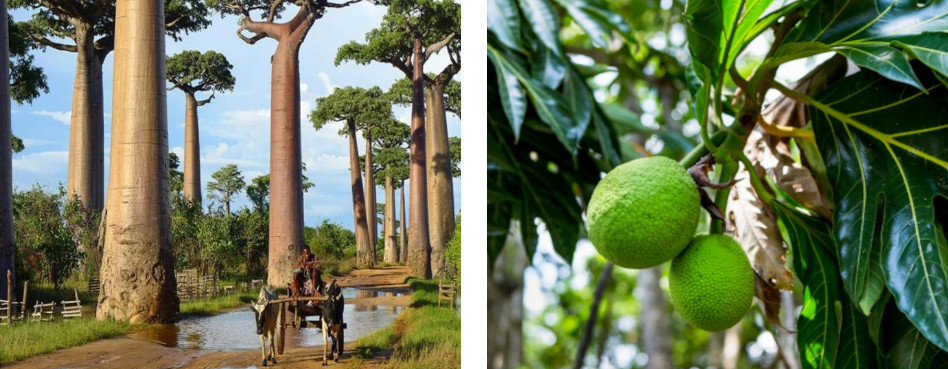
The Baobab tree (Adansonia Digitata) is mainly found in Africa, especially in the warmer and drier areas of the continent.
The name of Baobab is derived from the Arabic word buhibab meaning “fruit with multiple seeds”.
The tree known for its size, is known for its strange shape and proportions.
With its massive trunk, twisted branches and hairy fruits, the Baobab has adapted to arid and hostile environments and its particular structure is the explanation of its survival in such environments.
The massive trunk has little wood fiber and can hold 300 liters of water, allowing it to survive for long periods without rain.
In periods of drought the local population manages to obtain water from this natural reservoir.
The fruit of the Baobab is oval or round with a very hard outer capsule. The internal fruit is devided into small floury, dehidrated slices that contain seeds and filaments.
It has a slightly acidic taste due to the presence of organic acids (citric, tartaric and malic).
The Baobab fruit is considered a traditional remedy, particularly suitable for pregnant women, children and the elderly, thanks to the high content of non-dairy calcium (370 mg / 100 g and Vitamin C (163 mg / 100 g).
For all property and for what it provides to the African population, it is called the tree of life.
Property:
- The fruit of the Baobab is considered an important nutritional supplement due to its high content of Vitamin C.
- High content of antioxidants.
- It has a high calcium content, higher than milk and yoghurt. It is used by mothers who have to breast-feed.
- Anti-inflammatory, analgesic, antipyretic properties.
Application:
Smoothies, cereal bars, yogurt, milk drinks, flavored waters, jams and baked goods.
It has also been proven to stimulate the restoration of intestinal flora; a potential probiotic ingredient.
Products:
Depectinised extract: Ideal for ice teas and carbonated drink formulations. This extract is popular where clarity of the formulated product is a prerequisite.
Baobab fruit pulp powders: Typically used in dairy formulations (yogurt), instant powder mixes, smoothies and jams.
Baobab pectin cubes: Ingredient for fruit bars, breakfast cereal and snacks.
Baobab oil: Ideal as a carrier oil in cosmetic applications.